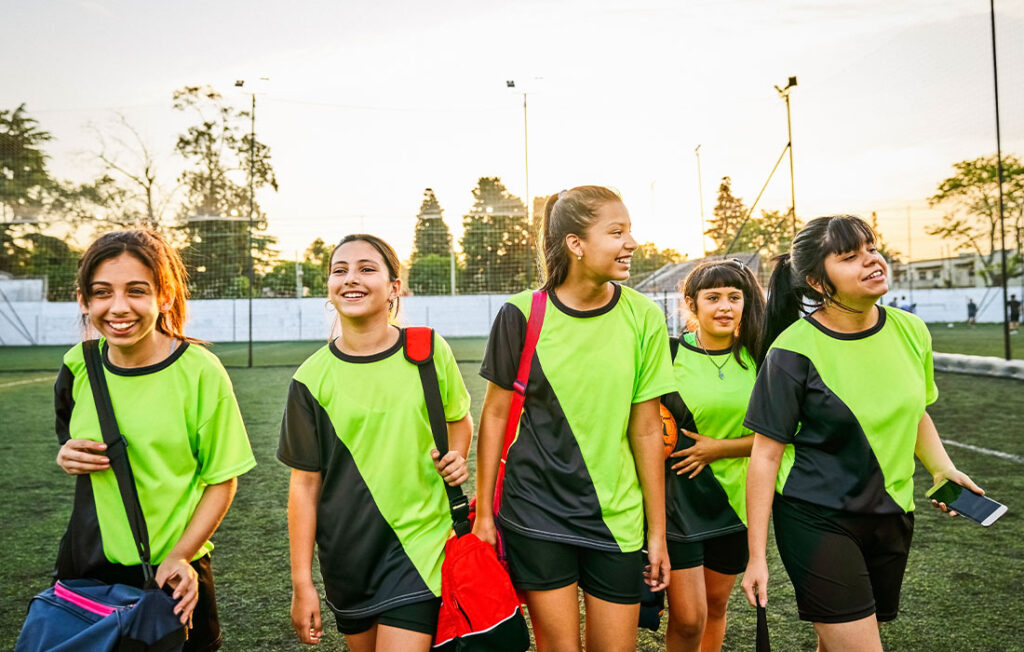5 Tips to Make Overnight Sports Camp Safer for Teen Athletes

Overnight sports camps provide countless opportunities for competitive teen athletes to improve their skills and grow together as teammates. Athletes often come away from these trips having formed deeper, lasting bonds with each other, leading to new team rituals, stronger teamwork, and camaraderie that lasts throughout the season.
While these training camps offer an exceptional opportunity for growth, traveling and sleeping in hotel rooms or residential dorms can be high-risk environments for abuse or misconduct to occur. As a parent or guardian, you can prepare to send your teen to camp by better understanding the ins and outs of these new environments and knowing what questions to ask.
5 Tips for Parents & Guardians
If you have a teen athlete who’s packing their sports equipment and preparing to spend a week or more training with their coach or team, take a moment to ask questions and understand the policies in place to ensure they have an experience that’s positive and safe.
Below, we list 5 things you can do to help make your teen’s trip a success.
- Training and knowledge are key. Before the trip, reach out to the camp organization or program administrator and ask if coaches, staff members, and volunteers have been trained on abuse prevention principles. Confirm the policies in place to safeguard athletes.
- Understand the sleeping arrangements and ask about room check procedures. Review the overnight travel policy to understand what the sleeping arrangements will be and confirm the policy around conducting room checks. Ask if they require two adults to be present when checking rooms.
- Curfews go a long way. Ask the coach or program administrator about their curfew policy. Talk with your teen about this policy and how it works to keep them safe.
- Talk about hazing rituals beforehand. Before camp starts, have a conversation with your teen about hazing rituals, what they are, why they’re dangerous, and how to say “no” to engaging in them.
- Ask about the use of common areas. Abuse often happens with a youth athlete is along with an adult. Confirm that the program has a clear policy that limits one-on-one interactions between adults and minors. Remind your teen that they should always meet with an adult, like a coach or staff member, in a common area, like a hotel lobby or camp cafeteria.
Policies That Protect
Comprehensive overnight travel policies can help athletes feel more comfortable and secure while staying away from home. The U.S. Center for SafeSport’s Minor Athlete Abuse Prevention Policies (MAAPP) set important boundaries to keep athletes safe and reduce the risk of abuse during sport-related activities, including overnight travel to summer sports camps.
For example, the MAAPP’s one-on-one policy states that a youth athlete should never be alone in a private space—like a hotel room—with an adult, like a coach. Other policies, like requiring two adults to be present for room checks, can also help protect both athletes and coaches alike.
While the MAAPP policies only apply to sports that are part of a National Governing Body within the U.S. Olympic and Paralympic Movement, they serve as guiding principles for creating safer sport environments for all.
Take Action
Attending an overnight training camp is often a crucial step in a teenage athlete’s journey toward playing on a higher stage. Explore our Tips for Parents: Travel handout to learn more ways you can support them.
Through free online courses for parents and teens and easy-to-use educational resources, the U.S. Center for SafeSport equips parents with information and tactics to help reduce the risk of harm.
